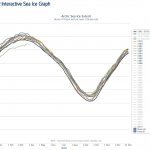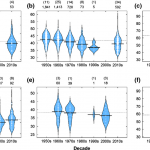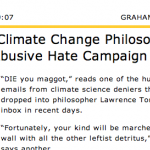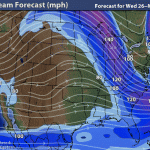Climate Change
I'm going to update this graph every now and then.
There are 12 lines on this graph.
The colorful squiggles up along the top are the first ten years of Arctic Sea ice extent for the period for which we have really good data. So this is 1979 - 1988. There is reason to believe that this is the "normal" sea ice extent track over the year from which we have seen significant deviation over recent decades.
The dark thick line is the average of all of the years from 1979 to 2010. Notice that the first ten years are all above the average except for a few little bits.
The partial line below all…
Salamanders can be a proxyindicator for climate change. Changes in salamanders have been linked to climate changes during ancient times, and in a very recent study, salamanders in the US Appalachians seem to have changed in relation to anthropogenic global warming. In fact, the changes observed in these Appalachian salamanders is quite large, very rapid, and thus, alarming. I’m going to describe this study in some detail, and as a bonus for sticking with me on this, I’ll throw in some entertaining Climate Science Denialism near the end. As an additional bonus prize, you’ll get a nice new…
Michael Mann, Byron Steinman, and Sonya Miller have just put out a new paper on climate change which addresses a number of key concerns. The paper is called “On Forced Temperature Changes, Internal Variability and the AMO.” Here’s the abstract:
We estimate the low-frequency internal variability of Northern Hemisphere (NH) mean temperature using observed temperature variations, which include both forced and internal variability components, and several alternative model simulations of the (natural + anthropogenic) forced component alone. We then generate an ensemble of alternative historical…
Above is the nifty interactive graphic from the National Snow and Ice Data Center showing sea ice extent in the Arctic for the current year (the lower squiggle). This year's squiggle looks like a peak, and it is possible that Arctic Sea ice extent is now on the decline. Minimum extent is typically reached in September.
The other squiggles are all the years since 1979 that seem to have had peaks later in the year than this year's apparent peak of a couple of days ago. Those years are 1992, 1997, 1999, and 2010. In other words, for the available data set, four out of 34 years, or just over…
This is a followup on Are the climate science deniers criminals?, which explored recent work by Lawrence Torcello, a philosopher at Rochester Institute of Technology. (See: Is Organised Climate Science Denial Criminally Negligent?)
Professor Torcello's point was made in part by reference to the tragic events at L'Aquila, Italy, where a screw up mainly by non-scientist government official seems to have resulted in unnecessary deaths due to an earthquake. Torcello notes:
If those with a financial or political interest in inaction had funded an organised campaign to discredit the consensus…
From meteorologist Paul Douglas:
Published on Mar 14, 2014
Weather seems to be staling. Look into how the speed of the jet stream causes this "stuck in a rut" weather pattern. Meteorologist Paul Douglas also takes a look back as to how this winter compares to years past. Checking out extreme drought conditions, snow cover and cooler temperatures overall. This did not only impact the U.S. but other areas of the world. England experienced their wettest winter yet!
Today, Wednesday, an immense storm will move into the Canadian Maritimes after grazing the US East Coast. In the US the storm may severely affect Cape Cod with many inches of snow and hurricane force winds. At sea, in the northern Gulf of Maine and points north, there is a severe risk to boats with very high waves and very severe winds. Halifax could get a foot or two of snow and there will be high coastal waves and strong winds.
This is a rare storm, but of the class of storms that seems to have become more common as the global system of air currents shifts under conditions of global…
After 16 minutes, Michael Mann on climate change, climate sensitivity, etc.
Why does Joan of Arc Being look so worried? The fire hasn't even touched her!
Mann uses the analogy of a person jumping (or being thrown?) off a tall building, and as he passes the third floor notes that everything is fine. Another analogy that might be helpful is being burned at the stake. After they tie you to the stake and pile up the wood, you're fine. Then they light the wood on fire and you're still fine. For a while.
The climate sensitivity graph above is from here.
It is very hard for me to view the world without my Anthropological glasses, since I’ve been one kind of Anthropologist or another since I was 13 years old. Thinking about climate science deniers, I realized what makes them annoying to me. Let me tell you what I mean.
The ongoing conversation at an archaeological site.
When Archaeologists (a kind of Anthropologist, in the tradition I was trained in) dig a site, they are constantly learning about what is under ground at that location, and throughout the process develop a model of what it all means. As an aside I should mention that…
WTF Frontiers in Psychology Journal? Scientists publish a peer reviewed paper in your journal, a bunch of cranks complain about it, and successfully bully you into taking the paper off your web site? Do you seriously want the rest of the scientific world to take you seriously, ever, from now on? I'm thinking that's not going to happen. We await a full and unmitigated apology to Stephan Lewandowsky, JohnCook, Klaus Oberauer and Michael Marriott, the authors of Recursive fury: conspiracist ideation in the blogosphere in response to research on conspiracist ideation
In the mean time, since you…
Well before mid century we will probably pass a threshold beyond which we'll really regret having not curtailed the release of fossil Carbon into the atmosphere in the form of Carbon Dioxide. The best case scenario for "business as usual" release of the greenhouse gas is that some of the carbon, or some of the heat (from sunlight) gets taken out of the main arena (the atmosphere and sea surface) and buried or reflected somewhere for a while, and this all happens on a slightly delayed time scale.
The reason we know this is a little thing called science. And, more exactly, physics. And…
A few days ago I made a prediction for this year's minimum Arctic Sea Ice extent. That's still valid. Or not. Either way, it's still my prediction.
But looking at the ice over the last few days, we see that for the first time in a while the extent of ice estimated by the NSICD has stopped hugging the -2SD line and is rising upwards like a chilly Phoenix rising out of slush ashes. In fact, one could even say that Arctic Sea Ice has recovered! Just look at the last eight days of data!
Think I'm cherry picking? It's possible, let's look at the larger picture, over a whole year's cycle:…
Our future is at risk. The science is settled, in the main, though there are many details to continue to work out and there are unknowns. But no one doubts that business as usual release of fossil carbon into the atmosphere mainly as the greenhouse gas Carbon Dioxide spells big trouble for humanity and the planet Earth, including eventual massive sea level rise and highly disruptive changes in the Earth’s climatology that will make a mess of many things including our food supply. Think failed state. Think Syria. Now, think failed planet, Syria over half the globe, the other half merely a mess…
Peter Sinclair has tackled this difficult topic with an excellent video and informative blog post. The blog post is here, and I've pasted the video below.
This is a complicated issue. The water problem in California is obviously made worse by increased demands from population growth and expansion of agriculture. Under "normal" (natural) conditions, California and the American Southwest is fairly dry and can undergo extra dry periods. But climate change seems to be playing a role here as well. It appears that recent lack of rain in the region is the result of changes in atmospheric…
We are reaching the point where Arctic Sea ice tends to max out, in terms of extent (I will not be talking about volume here, though that is vitally important). Using data provided by the National Snow and Ice Data Center, I ran an informal "Science by Spreadsheet" analysis and came up with a prediction for the minimum extent of sea ice this year, which would be some time in September.
This is mostly a seat of the pants analysis and don't take it too seriously, but feel free to put your bets in the comments section.
The data over the last few decades shows a generally declining extent of…
Daphne Wysham and Daniel Weiss interviewed on Real News about the event of two nights ago.
A bunch (maybe 30 or more) of US Senators are going to talk all night tonight about climate change. This will happen on the Senate floor. So far all or most of them are Democrats. Here is a list of who is doing it, with their twitter handle. Also on the list is who is not doing it. And, there are phone numbers too.
Your assignment, should you choose to accept it, is to tweet or call those who are doing it and thank them, and tweet or call those who are not and tell them that they should.
I'm pretty sure this list, at Dail Kos, will be updated dynamically throughout the process.
Go.
Neil DeGrasse Tyson on CNN:
And while we are on the topic, Carl Sagan, of the original Cosmos, on climate change:
See also this from Chris Mooney at Mother Jones.
And just for the heck of it, here's my interview with Neil deGrasse Tyson from 2011.
Washington, DC - During a press conference today, Senators Barbara Boxer (D-CA), Chairman of the Senate Environment and Public Works Committee, and Sheldon Whitehouse (D-RI), announced the members of a newly formed Senate Climate Action Task Force and discussed their plans to take action on climate change.
Click here to watch the video of today's press conference.
The members of the task force are listed below:
Senator Barbara Boxer (D-CA)
Senator Sheldon Whitehouse (D-RI)
Senator Maria Cantwell (D-WA)
Senator Robert Menendez (D-NJ)
Senator Ben Cardin (D-MD)
Senator Bernie Sanders (I-VT)…
Third warmest in Alaska since records began. Hot in China. Also, we may have a nut shortage. Video from WeatherNation:














